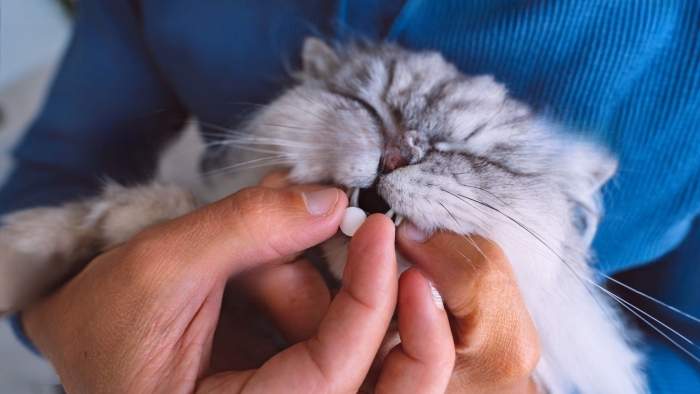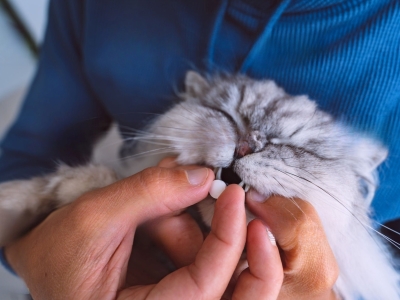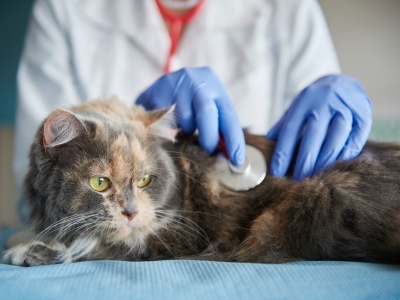As a responsible and caring cat owner, it’s natural to be concerned about your furry companion’s health and well-being.

Just like humans, cats can experience pain and discomfort due to various reasons, such as injuries, arthritis, or post-surgery recovery.
While seeking ways to alleviate your cat’s pain, you might wonder about the safety of using over-the-counter medications like aspirin.
In this article, we’ll explore the topic of giving aspirin to cats and provide essential information to ensure your pet’s health remains a top priority.
What is Aspirin, and How Does it Work?
Aspirin is the brand name of the drug acetylsalicylic acid, which belongs to a group of drugs called Non-Steroidal Anti–Inflammatory Drugs (NSAIDs).
NSAIDs work by blocking a chemical called cyclooxygenase (COX), which is capable of creating prostaglandins. Prostaglandins are chemicals that cause irritation, pain, and fever within the body.

Aspirin lowers the production of prostaglandins by inhibiting COX, which reduces inflammation, discomfort, and fever.
Prostaglandins also protect the stomach lining, control blood flow to the kidneys, and prevent blood clots, among other crucial roles in the body.
As a result, inhibiting COX may also harm these organs and systems.
How Much Aspirin Can I Give a Cat?
The standard dosage of aspirin for cats is 6 to 10 milligrams per kilogram of body weight.
However, since cats metabolize aspirin slowly, you should only give this medication every 48 to 72 hours.

This means that a 10 kg cat can safely consume about 60 to 100 mg of aspirin every two or three days, which is equivalent to about one quarter or one half of a regular 325 mg aspirin tablet.
According to the illness and the particular cat, the aspirin dosage may change. A few cats may require distinctive doses, or they may require pharmaceuticals more or less regularly.
That is why you should always ask your veterinarian’s consent before giving aspirin to your cat.
Your veterinarian will choose the appropriate dosage, frequency, and duration of therapy based on your cat’s weight, age, health, and medical history.
What Are the Side Effects and Risks of Aspirin for Cats?
Aspirin can cause several side effects and risks for cats, especially if given in high doses or for long periods of time.
Some of the most common side effects and risks are:
Gastrointestinal problems
Aspirin can irritate the stomach and intestines and cause ulcers, bleeding, vomiting, diarrhea, and a loss of appetite[1].
Kidney problems
Aspirin can reduce blood flow to the kidneys and cause kidney damage or failure[2].

Liver problems
Aspirin can interfere with liver function and cause liver toxicity or failure[3].
Bleeding problems
Aspirin can inhibit platelet aggregation and clotting factors and cause bleeding disorders or hemorrhage
Allergic reactions
Some cats may be allergic to aspirin and develop symptoms such as hives, itching, swelling, difficulty breathing, or anaphylaxis
If your cat shows any signs of these side effects or risks, you should stop giving aspirin and contact your veterinarian immediately[4].
What Are the Precautions and Contraindications of Aspirin for Cats?
Almost all cats should not take aspirin.
If your cat suffers from any of the following ailments or circumstances, you shouldn’t feed them aspirin:
- History of gastrointestinal ulcers or bleeding
- History of kidney or liver disease
- History of bleeding disorders or anemia
- Pregnancy or lactation
- Dehydration or shock
- Infection or inflammation
- Surgery or trauma
- Hypersensitivity or allergy to aspirin or other NSAIDs

Also, on the off chance that your cat is on any other drugs that might interfere with ibuprofen, you shouldn’t provide them with ibuprofen.
Some of these medications include:
- Other NSAIDs (such as carprofen, meloxicam, ketoprofen)
- Corticosteroids (such as prednisone)
- Anticoagulants (such as heparin)
- Anticonvulsants (such as phenobarbital)
- Diuretics (such as furosemide)
- Insulin or oral hypoglycemic agents
Always advise your veterinarian of any medications or supplements that your cat is taking before giving aspirin.
Seeking Professional Veterinary Care
If you suspect your cat is in pain, it’s imperative to consult a veterinarian before attempting to administer any form of medication.

Veterinarians are trained to assess your cat’s condition, diagnose the underlying issue, and recommend appropriate pain management strategies.
Depending on the situation, your veterinarian might prescribe cat–safe pain relievers, which are specifically formulated to minimize risks and provide effective relief.
Safer Alternatives for Cat Pain Relief
When it comes to managing pain in cats, there are safer alternatives than over-the-counter medications.
Your veterinarian might recommend prescription medications designed for feline use as well as non–pharmacological approaches such as weight management, physical therapy, and environmental modifications[5].
FAQs
Are there any human pain relievers that are safe for cats?
Human pain relievers, including aspirin, are generally not safe for cats due to their unique physiology.
Cats lack certain enzymes needed to process these medications, making them highly susceptible to harmful side effects. Only use medications prescribed by a veterinarian specifically for your cat’s condition. Veterinarians have access to feline-safe pain relievers that are formulated to minimize risks and provide effective relief.
What are the signs of pain in cats?
Cats can be skilled at masking pain, but some common signs include changes in behavior, decreased appetite, hiding more than usual, increased aggression or irritability, reluctance to move or jump, changes in grooming habits, and vocalization. If you notice any of these signs, it’s essential to consult a veterinarian to determine the underlying cause and appropriate pain management strategies.
Can I use natural remedies for cat pain relief?
Natural remedies like supplements and herbs should also be used with caution and under the guidance of a veterinarian.
Not all natural products are safe for cats, and some might interact with other medications your cat is taking. Always consult your vet before using any natural remedies to ensure they are safe and appropriate for your cat’s individual needs.
My cat is on other medications. Can I still give them aspirin?
It’s crucial to inform your veterinarian about any medications, supplements, or treatments your cat is currently receiving.
Aspirin can interact with other drugs and lead to unexpected complications. Your vet will consider your cat’s complete medical history before recommending any pain management strategy, ensuring that there are no harmful interactions.
Are there any specific breeds that are more sensitive to aspirin?
While individual sensitivities can vary, there is no specific breed that is known to be more or less sensitive to aspirin.
Cats, in general, have a heightened sensitivity to NSAIDs like aspirin due to their unique metabolic processes. Regardless of breed, it’s best to avoid giving aspirin to cats and rely on veterinarian-recommended solutions for pain management.
Conclusion
In conclusion, the question of how much aspirin you can give a cat has a simple answer: none.
Aspirin is not safe for feline use due to their unique physiological makeup and sensitivity to certain medications.
If you suspect your cat is experiencing pain or discomfort, reach out to your veterinarian immediately.
The best way to ensure your cat’s health and well-being is to work closely with a veterinary professional who can provide expert guidance and tailored solutions for your pet’s specific needs.
Your cat’s safety and comfort should always be top priorities.
Reference:
- 7 common GI problems in cats | PetMD
- Chronic kidney disease in cats | VCA Animal Hospital
- Liver disease in Cats | International Cat Care
- Cat allergies: Symptoms, causes, Treatments, and diagnosis | WebMD
- Safe pain medications for cats | WebMD

Dave is our best team member when it comes to taking care of pets on daily basis. This is because he used to be a full-time pet sitter before joining CatLikesBest. Besides contributing his precious knowledge on cat care tips and everyday-use pet products, he still does pet sitting as part of his hobby in his free time.

